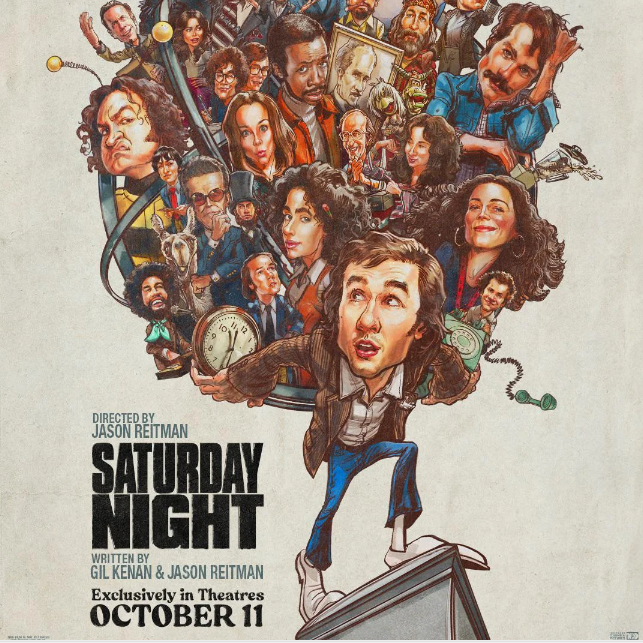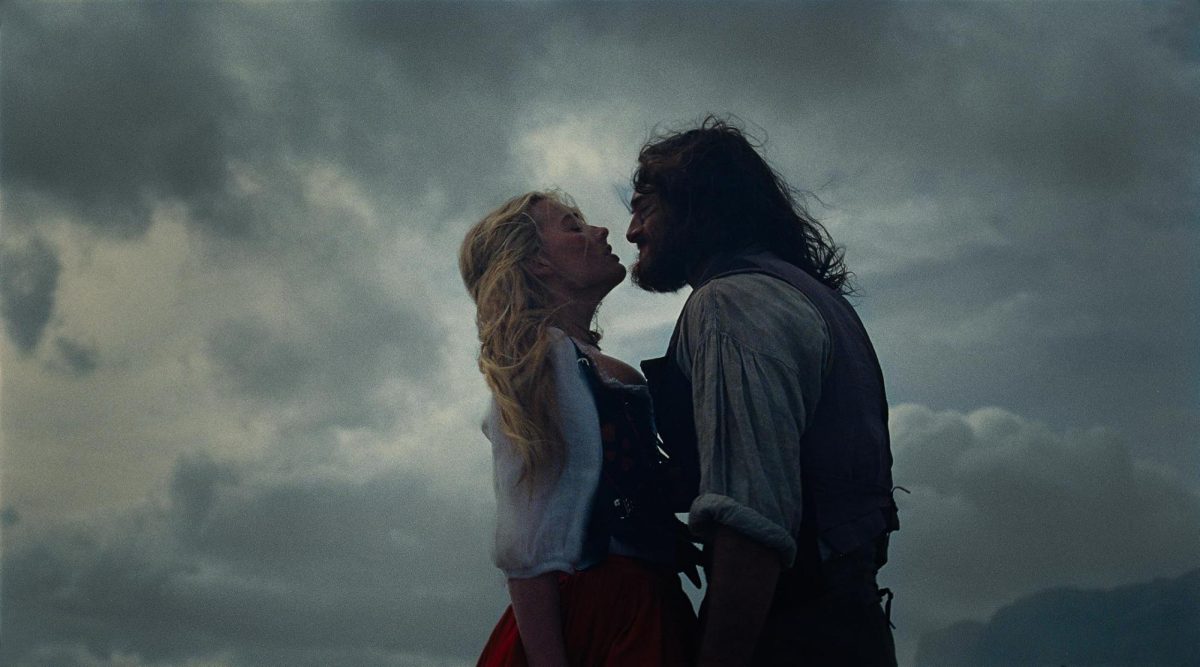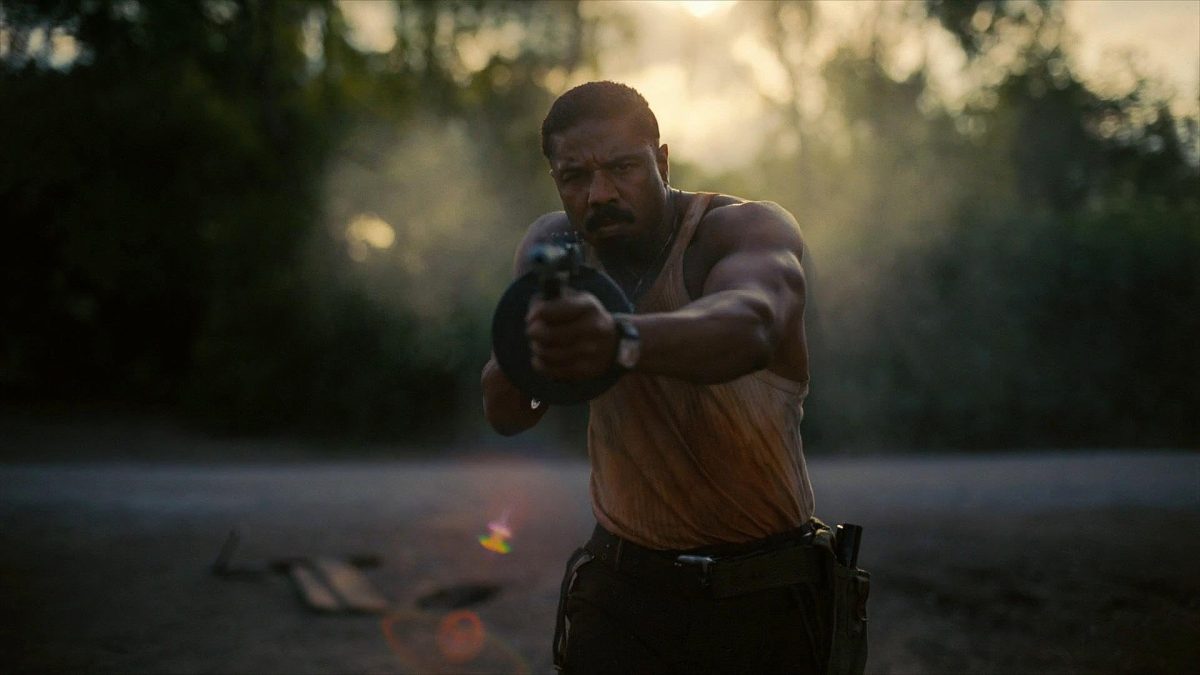Rating: 7/10
Based on vibes alone, “Saturday Night” is a great movie. The palpable anxiety of the now-iconic show’s first broadcast drives the energy through the roof. However, at times, it feels like a rushed dress rehearsal.
Directed by Jason Reitman, the movie — originally titled “SNL 1975” — recounts the 90 minutes leading up to the very first episode of variety show “Saturday Night Live,” which aired Oct. 11, 1975.
Released on the 49th anniversary of that broadcast, “Saturday Night” serves as both a tribute and an exercise of self-mythologizing, glorifying the seemingly humble beginnings of a show now embedded in American pop culture.
Get The Daily Illini in your inbox!
In a key scene, NBC executive Dick Ebersol (Cooper Hoffman) asks show creator and producer Lorne Michaels (Gabriel LaBelle) if he even knows what the show is about. Michaels answers with a Thomas Edison lightbulb analogy, saying the world didn’t initially understand his innovative creation, which comes off as a bit self-important.
This scene would feel more impactful if it didn’t repeat itself in slightly different forms throughout the movie. Yet it hints at the film’s underlying theme — an ambitious project that struggled to fully shine at first.
The strong ensemble excels in recreating the first set of performers called the “Not Ready for Prime Time Players,” including Gilda Radner (Ella Hunt), Dylan O’Brien (Dan Aykroyd) and John Belushi (Matt Wood).
O’Brien and Wood deliver standout performances, partly because their characters receive more screen time than the rest of the cast; much of the film’s conflict derives from Belushi’s (Wood) refusal to sign his contract.
Lamorne Morris brings a refreshing and vibrant nuance to his portrayal of Garrett Morris, addressing the hardships the actor went through as the only Black cast member. On the other hand, Cory Michael Smith plays a convincingly arrogant Chevy Chase, fully channeling his aura.
Unfortunately, the film underuses the women in the ensemble. Besides Hunt’s earnest depiction of Radner in a touching ice skating scene outside of Rockefeller Plaza, the main highlight is Rachel Sennott.
Sennott portrays Rosie Shuster, Michaels’ then-wife and writer for the show. Her character acts as an anchor for the production, adding much-needed grounding to the erratic narrative.
Most notably though, the movie seems to forget that not everyone is a “Saturday Night Live” fan and that the show is not particularly known outside of the United States.
As a result, the characters sometimes feel one-dimensional — reduced to quirks rather than fully developed personalities — not because of the actors’ lack of skills, but because the film has too little time to flesh the characters out.
Visually, the movie stuns. Shot on 16mm film, it captures the grainy texture of the ’70s. The production design is meticulous, recreating the period in vivid detail.
The dynamic camerawork mirrors the amped-up energy, making the audience feel like they’re running with the cast and crew as they head toward showtime.
Reitman heightens the tension with sporadic time cards, marking the minutes left until the live broadcast, and therefore, the time left in the movie. Despite the ticking clock, it’s not always clear why the stakes are so high or why they matter.
While it may have been groundbreaking at its start, modern audiences might struggle to grasp what was so revolutionary about the show other than the youth and inexperience of the first cast.
After all, Michaels — portrayed as a visionary — is still a young, white Canadian man with limited diversity in his original lineup. Given the recent talk surrounding “Saturday Night Live’s” relevance, the film could have explored this issue more meaningfully.
The movie concludes with the now-famous line “Live from New York, it’s Saturday Night!” leaving the audience waiting for more, once again assuming everyone knows what came next. Nevertheless, the suspense is brilliantly executed.
The film tackles an intriguing premise but struggles to fully deliver due to the time constraints of its narrative. Simply put, it’s a lot to cover.
Ultimately, “Saturday Night,” just like the real show, is an ambitious and well-made project, clearly made by artists passionate about the origin of the series and the chaotic craft.









